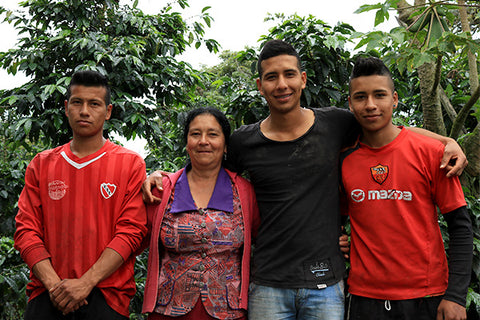A Pilgrimage to the Future

I was crammed in a tiny 4x4 with two longtime friends, a hired driver, an agronomist, and a relationship manager from Caravela Coffee, all venturing to see a producer whose coffee has inspired us. That producer is Carlos Imbachi of Finca Buenavista.
I was joined on this trip by a couple roasters I had met at a regional Brewers Cup competition in 2013, where we all competed against each other. Back then, our knowledge of the green side of the industry was nonexistent, but we were passionate about specialty coffee and eager to learn more.
For me, those competitions and Specialty Coffee Association events provided the perfect catalyst to explore the more progressive thoughts and theories that were developing, in my own mind and throughout the specialty side of the industry at the time. Brewers Cup specifically granted me the platform I needed to speak my mind on issues facing our industry. I was able to meet people who were just as passionate—if not more so—than I was, and I grew professionally from these interactions.

Yolanda Samboní Imbachi with her sons Ever, Diego and Yancarlos Imbachi
I asked my trip companions how spending time as competitors and roasters has been beneficial to their coffee careers. We all agreed that the access to a greater network was crucial to our personal development, but they also had some intriguing opinions about how they got where they are today. In unison, they said there had been a void that needed to be filled.
That idea really struck home with me. When I dove head first into specialty coffee, I found not only that this was a job that required a passionate individual, but that I personally needed something to be passionate about. It was during this time in my life that a sample of Carlos Imbachi’s coffee came across the cupping table, through the import company Caravela Coffee, and it knocked my socks off. I was utterly confused because, though it tasted like a Kenyan, I knew the importer worked only in Latin America. The quality of that coffee made such an impression on me, I knew one day I would need to work more closely with Carlos Imbachi. A few years later, I had accomplished my goal and was working at Caravela.
Fast-forward to our current trip in Huila: When we got to the top of the mountain, we were greeted by Diego Imbachi, age 20, who told us his father, Carlos, would not be able to meet with us today. Honestly, I was pretty disappointed, although I tried my hardest not to show it. This trip was like a pilgrimage for all three of us to meet the man who produced the coffee that changed our perspectives on quality and attention to detail.
 Diego Imbachi
Diego Imbachi
As we stepped through the mud and pushed back branches, Diego timidly told us about his role at the farm, where he has begun taking on more responsibility. He described the dilemma he found himself in a few years back: Should he stay in the family business or go to school to become a computer programmer? Just as he was about to decide to go to university, he attended a cupping and workshop for children of coffee producers, and his life changed forever. Like the competitions and events Andrew, Jonathan and I had attended, this community coffee workshop had been the catalyst for Diego to pursue coffee as a career. He also told us there was a void in the family business. Someone needed to become the forward thinker and experimenter in the family, so they could remain competitive in the Colombian market. He was afraid if he didn’t do it, no one would, and the legacy of his family’s farm would be lost.
 Sonia Imbachi
Sonia ImbachiAs we arrived at the new plot of Gesha plants, it all clicked for me. Here we were, coffee professionals from different corners of the globe, standing on top of a mountain in Colombia witnessing a new crop of plants attempting to grow in their environment. It was the perfect illustration of the continuous change that needs to happen for our industry to remain relevant. The four of us were all children from an alternative school of thought, brought together by community efforts, global coffee organizations, and our desire and passion to step into the coffee chain to deliver the best cup of coffee possible.
I felt silly. This story wasn’t about some romanticized pilgrimage to a famous coffee producer who had motivated us to progress in the industry. This story was about the torchbearers, the flame keepers and the unsung heroes of the specialty coffee industry who are driven by passion, obsession and moments of madness to create something bigger than ourselves.
 Didier Imbachi, Quality Assurance Coordinator at Caravela
Didier Imbachi, Quality Assurance Coordinator at Caravela
Hours later, as we started our journey back down the mountain, I was no longer disappointed. Instead, I was delighted that I had been able to meet Diego, because he is the future of coffee. It’s rare for a coffee producer’s offspring to stay on the farm, but the Imbachi family has passed on the tradition to all four children, each of whom found his or her own reasons to stay. With the average age of a coffee producer now over 50 in Colombia, it’s refreshing to see three young producers with the last name Imbachi paving their own path.



